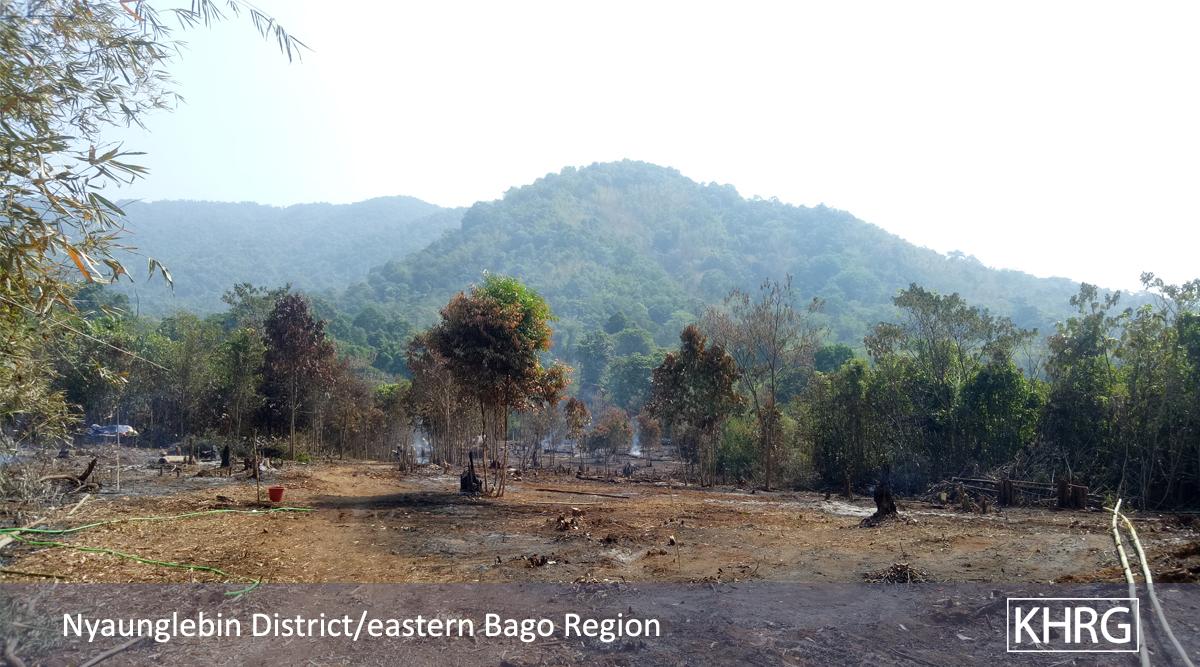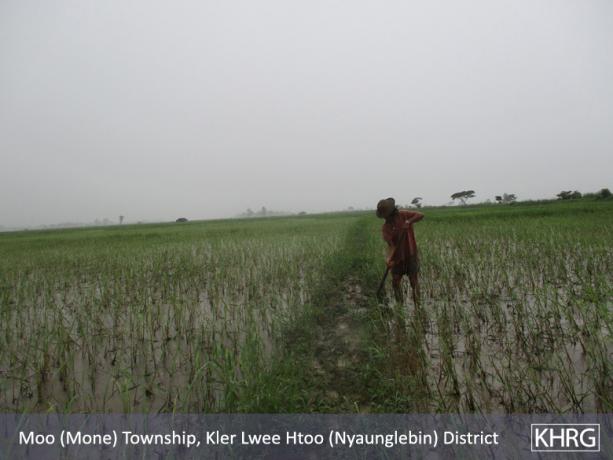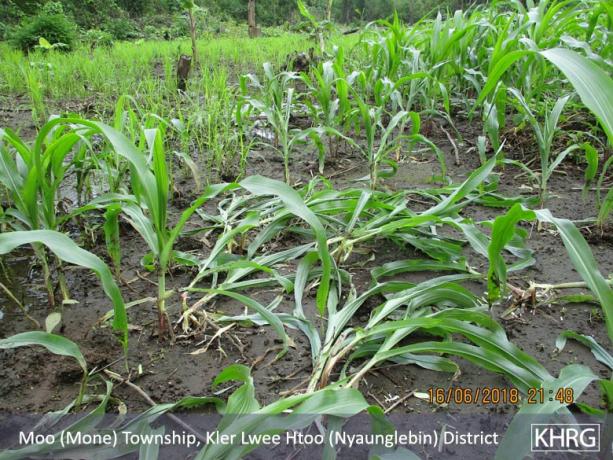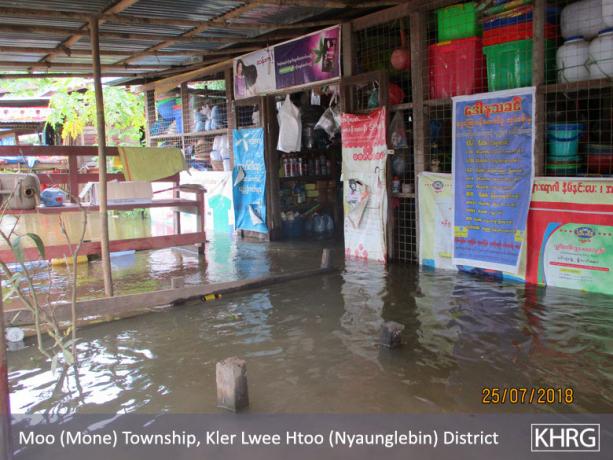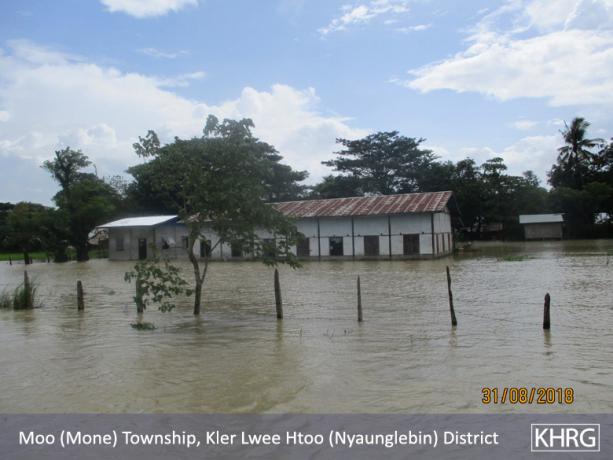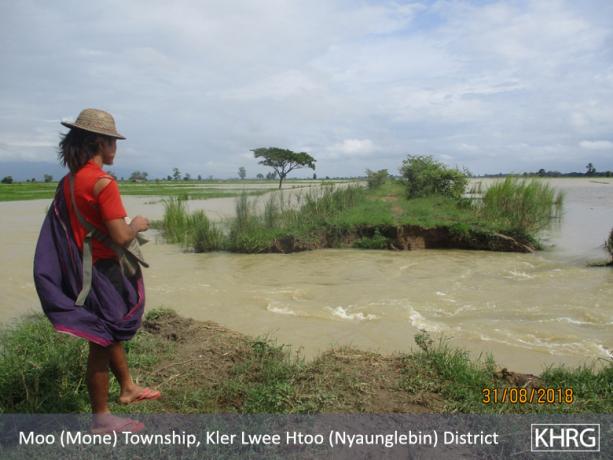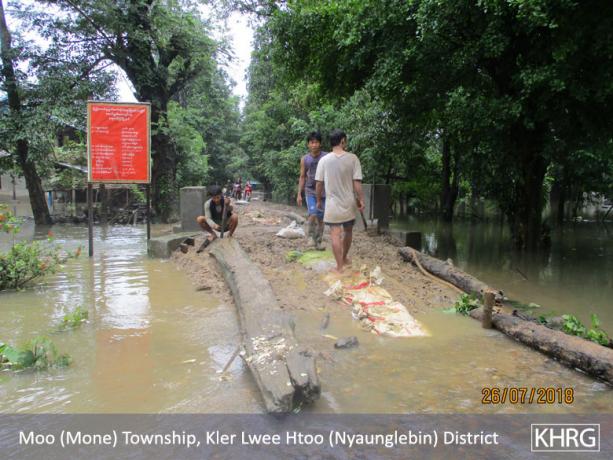This Situation Update describes events that occurred in Mone Township, Nyaunglebin District, between July and August 2018.[1] It puts forward the obstacles to IDP return and factors contributing to the economic migration of young people. It also covers the livelihood impacts of the flooding that took place during the rainy season of 2018.
Obstacles to IDP return
In 2016, Internally Displaced Persons (IDPs) returned to their 11 villages in the lowland areas of Moo Township. They had been displaced since 1975, when they were forced to leave by Tatmadaw Infantry Battalion #48, commanded by Bo Min Thein. In 2012, the KNU and the Myanmar government signed a preliminary ceasefire agreement that provided for the right of IDPs to return to their lands. Community leaders went to IDP camps to establish how many of them would come back. However, fewer people returned than originally expected.
Overall, only one-fourth of the IDPs went back to their lands. According to community leaders, this could be explained by the fact that returnees did not benefit from any kind of support, apart from the CIDKP digging wells and providing animal husbandry. In addition, there are no schools, hospitals and clinics in these areas. The closest clinic can only be reached through a bumpy road, and it is not easy to travel during the rainy season. Some IDPs are afraid to return because the Tatmadaw is still operating in the Hpapun area. Others also think that the political situation is not stable yet.
Since their return, there are a lot of land dispute problems. Some returnees saw their livelihoods threatened when their family lands were usurped by richer villagers. These villagers took advantage of the fact that the rightful owners did not have official land ownership documents, and went to the Myanmar Land Administration Department to register the disputed lands in their names. The people who lost their lands are now experiencing serious economic difficulties, as they were deprived of their main source of income.
The successful return of displaced populations is dependent on the peace process initiated by the Nationwide Ceasefire Agreement, which is currently stalled. This uncertainty prevents some IDPs from returning.
Youth migrating abroad
There are not enough jobs in Moo Township, which creates problems for local people. Because some households do not have land or cattle, they cannot sustain themselves. Many young people are migrating abroad for work because informal workers are poorly paid in Moo Township and the kyat is losing value.
There are 180 households in Sweh town, T’Kaw Pwa village tract. Thirty-two young people (25 men and 7 women) have already migrated abroad for work. Up to 80% of the youth from Moo Township has already migrated or is planning to migrate in the near future. Many of them move to Thailand, Malaysia or Singapore. More are planning to leave, and some are already waiting for confirmation [from illegal smugglers commonly referred to as ‘agents’ by local people].
Migrating abroad can cost over 1,500,000 kyat [USD 986]. Young people who want to migrate have to borrow money and pay it back with interest every month. However, some had to wait up to six months before leaving. Others could not afford to wait so they just cancelled the process and ended up losing money, which caused economic difficulties for their families.
Natural disasters causing livelihood difficulties
In the lowlands, a lot of fields were flooded following heavy rains in July and August 2018. This problem affected 350 fields in Way Sweh, T’Kaw Pwa village tract, and 814 fields in T’Kaw Pwa village. Local farmers did not receive support from the government, and some also had to abandon their farms because rodents ate their crops. Two NGOs, the Christian Social Service and Development Department and Samaritan's Purse, provided them with clothing, drinking water, water purification tablets and tarp. Because of the decrease in production caused by the flooding, some farmers had to borrow money to overcome their economic difficulties. This situation also threatened the livelihood of local people who were engaged in trade, because it led to an increase in the price of goods when the kyat is already losing value.
In the mountain areas, the rain caused landslides, flooding and strong currents, which damaged the river banks and the trees nearby. Most of the bamboo bridges that had been constructed by local people were also damaged, which made transportation and travelling difficult, [further undermining access to food, healthcare and education]. In addition, the production of the farms dropped significantly over the reporting period due to a heat wave, several earthquakes and animal infestation. Because most of the local population is engaged in hill farming, they are now experiencing economic difficulties.
Footnotes:
[1] The present document is based on information provided by a community member in Nyaunglebin District who has been trained by KHRG to monitor human rights conditions on the ground.

